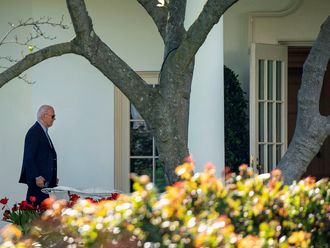Washington: Republicans recaptured control of the House early on Wednesday, besting Democrats in a billion-dollar battle and ensuring that the chamber will be dominated by their conservative agenda. Reacting to President Barack Obama’s re-election, House Speaker John Boehner said voters want both parties to find common ground on repairing the economy.
By early Wednesday in the East, Democrats had knocked off 12 GOP House members — including 10 members of the huge tea party-backed House GOP freshman class of 2010. Republican losers included four incumbents from Illinois, two each from New Hampshire and New York, and one apiece from Florida, Maryland, Minnesota and Texas.
Republicans nearly matched that, picking up nine previously Democratic seats. Their candidates defeated one Democratic incumbent apiece in Kentucky, New York, North Carolina and Pennsylvania and picked up an open seat in each of Arkansas, California, Indiana, North Carolina and Oklahoma currently held by Democrats who retired or ran for another office.
With more than 90 per cent of the 435 House races called by the Associated Press, Republicans had won 227 seats and were leading in nine more. For a majority in the chamber, a party must control 218 seats. Democrats had won 176 seats and were leading in 21 others.
It appeared likely that the two parties’ margins in the new Congress would closely resemble the current tally. Republicans control the chamber by 240 to 190, plus five vacancies: two seats once held by the GOP and three by Democrats. Early on Wednesday, it remained in doubt whether either party would ultimately have a net gain.
Paul Ryan re-elected
Among those re-elected to his seat was Paul Ryan, R-Wisconsin, the vice presidential candidate on the defeated GOP ticket with Republican presidential challenger Mitt Romney. And locked in a tight re-election battle was one-time GOP presidential hopeful and conservative firebrand Michele Bachmann of Minnesota.
Shortly after Obama’s re-election was clear, Boehner — re-elected without opposition — said voters had conveyed a desire for compromise. That was a departure from the House GOP’s general tone over the past two years, during which the conservative GOP House majority has had numerous bitter clashes with Obama over deficit reduction, taxes and spending.
“If there is a mandate, it is a mandate for both parties to find common ground and take steps together to help our economy grow and create jobs, which is critical to solving our debt,” Boehner said in a written statement.
Even so, the prospects of continued gridlock over major issues remained strong, both because of the GOP’s strong conservative bent and because Boehner has sometimes faced challenges shepherding his rank-and-file members to endorse deals he’s wanted to strike. Earlier in the evening, he seemed more combative.
“The American people want solutions, and tonight they responded by renewing our House Republican majority,” he said at a gathering of Republicans in Washington. “The American people also made clear there’s no mandate for raising tax rates.”
Fiscal cliff looms
One of the top fights when Congress returns for a post-election session this month will be over the looming expiration of income tax cuts first enacted a decade ago under President George W. Bush. Republicans want to renew them all, while Obama wants the cuts to expire for the highest-earning Americans.
In a national exit poll of voters conducted for the AP and the TV networks by Edison Research, the largest share — 48 per cent — said taxes should only be increased on income exceeding $250,000 (Dh918,275) a year, which is Obama’s position. Those voters heavily favoured Democratic House candidates. The one third who want no one’s taxes increased leaned heavily toward Republicans.
In remarks to Democrats just blocks from where Boehner spoke, House Minority Leader Nancy Pelosi said Democrats would be “fighting for reigniting the American dream, building ladders of opportunity for people who want to work hard and play by the rules and take responsibility.”
The GOP victory in the House contrasted with party’s performance elsewhere on the national stage. Besides Obama’s win, Democrats held control of the Senate and still could add slightly to their numbers there.
Pelosi, who was easily re-elected, has not said definitively whether she will continue to serve as Democratic leader.
Democrats in Illinois controlled the redrawing of congressional districts after the latest Census, and the new lines proved too tough for several Republicans. Hopes shrink
The nation’s most expensive House race remained too close to call. As Obama’s lead over Romney shrank as Election Day approached, Democrats’ hopes for recapturing the House shrunk as well.
Republicans, building off their enhanced control of statehouses, also did a robust job of protecting their incumbents and weakening Democrats when congressional district lines were redrawn after the 2010 census, especially in states like Pennsylvania and North Carolina.
In addition, out of a record $1.1 billion that House candidates and their allies spent in this year’s races, more than 60 per cent of it went to Republicans.
The economy and jobs dominated the presidential campaign, but there was little evidence either party had harnessed those issues in a decisive way at the House level. Both sides agreed that this year’s election lacked a nationwide wave that would give either side sweeping strength — as occurred when Democrats seized control in 2006 and expanded their majority in 2008, and Republicans snatched the chamber back in 2010.
Polls underscored the public sentiment that Democrats had hoped they could use to their advantage.
A CBS News-New York Times poll late last month showed just 15 per cent of Americans approved of how Congress was handling its job, near its historic lows. And an Associated Press-GfK poll in August showed that 39 per cent approved of congressional Democrats while just 31 per cent were satisfied with congressional Republicans.











